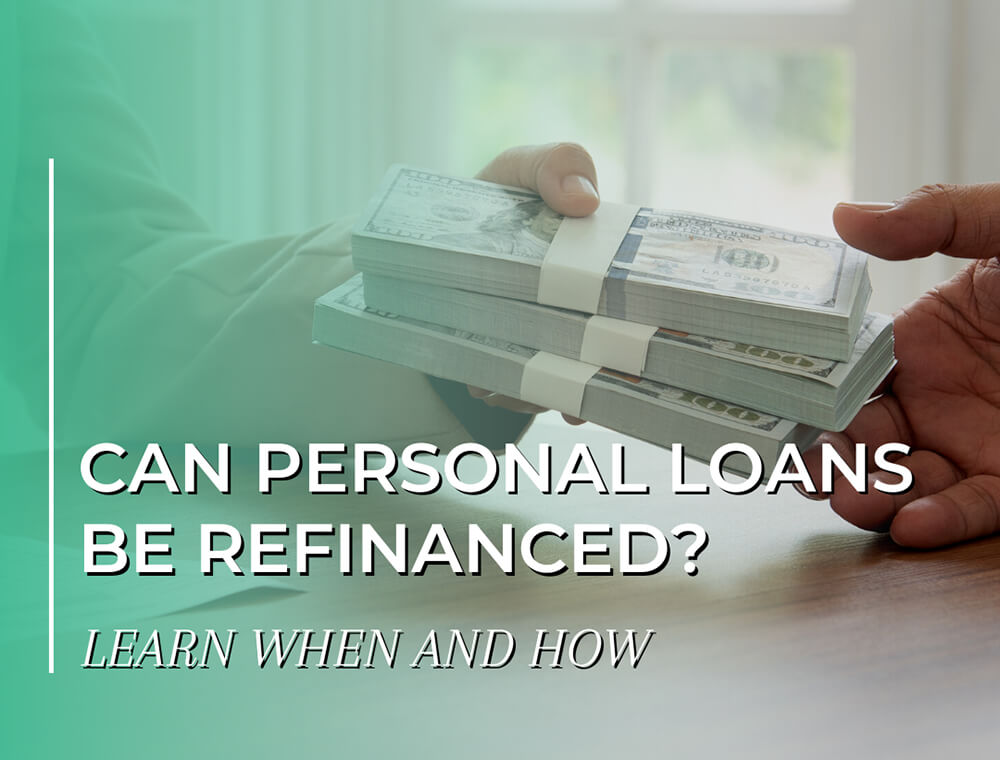
Can Personal Loans Be Refinanced? Learn When and How
Americans take out personal loans for a variety of reasons. These can go from starting a small business to renovating one’s home to financing a well-deserved holiday. In the wake of the pandemic, a higher share of personal loan volume has been going towards medical bills.
Nonetheless, debt consolidation is the most common reason people resort to personal loans. Essentially, many borrowers are using them to pay back previous loans. This way, they can merge previously contracted personal loans, outstanding credit card debts, etc. into one single loan, which they can repay with fixed monthly payments.
And this leads us to a related question: “can personal loans be refinanced?”
If so, when and how is it convenient to do so
Personal Loan Refinancing: The Basics
Technically, refinancing your personal loan is a very straightforward process. All it takes is contracting a new loan at a new rate, thus pushing the repayment rate forward in time.
Let’s look at the main reasons you may want to do that.
You Can Obtain a Lower Interest Rate
Decreasing your current borrowing costs is a valid reason for rolling over your loan.
There are various circumstances under which this may happen. Your FICO credit score may have improved after regularly meeting your personal loan or credit card repayment deadlines. Consequently, your lender is now willing to charge a lower interest rate. Similarly, there may have been a fall in interest rates, which makes it convenient to contract a new loan. This can happen because of a decrease in the overall demand for credit.
Keep checking your potential interest rate on new debt, even after contracting your first personal loan. If the opportunity arises, refinancing your loan can allow you to save a lot on borrowing costs.
You Want a New Type of Rate
Interest rates on personal loans can be either fixed or variable.
A fixed interest rate remains the same throughout the entire repayment period. This gives you more predictability when doing monthly budgeting. In contrast, a variable interest rate changes due to fluctuating market trends. It can be a convenient choice if you believe that rates will generally drop in the future.
Refinancing a personal loan allows you to change the type of rate you’re currently paying. Based on your personal convenience, you can switch from a variable rate to a fixed rate or vice versa.
You Want to Settle Your Debt Over a Longer Period
There are situations in which you may need more time to pay back a personal loan. For example, your salary may have decreased, or you may have to take a break from work for personal reasons. Some unexpected or emergency expenses may also be a cause for this.
In such scenarios, refinancing a personal loan allows you to take the time you need to settle your debt. And without the risk of missing payments and seeing your credit score take a dip.
The overall cost of your loan may increase, but the monthly payment can be reduced significantly, giving you more time and peace of mind.
What About Repaying the Loan Amount Faster?
Conversely, you may be in a position to pay a higher monthly payment and settle your debt in a shorter period. This could happen for different reasons. Your income may have gone up, you may have received an inheritance, or concluded a major one-time sale. This can allow you to get out of debt faster as well as reduce the total cost of your personal loan.
To Make a Long Story Short
In brief, there can be various situations where taking out a new personal loan to repay an old one is the right thing to do. The choice depends primarily on how interest rates behave over time as well as your ability or willingness to pay at a faster or slower pace.
Whether your reason for refinancing is to reduce the monthly payment or to benefit from a general decrease in interest rates, we are here to help.
The Level Advantage Loan offers very favorable conditions. With us, you can refinance your loan for amounts as high as $55,000 at competitive rates and with a fast-track application.
Get in touch and get a free loan offer today.
However, there are situations in which refinancing a personal loan may not be the ideal thing to do. Similarly, in certain circumstances, practical obstacles could make it challenging to roll over your loan (regardless of your intentions). Let’s explore these scenarios in greater detail.
When Should I Avoid Refinancing My Personal Loan?
You Would Be Charged a Higher Interest Rate
If taking out a new loan means having to incur higher borrowing costs, then it may not be a good idea after all.
Interest rates can be considerably higher now than when you first took out the loan. This could have been caused by economic trends or targeted actions by the Federal Reserve Bank.
It could also be that your current FICO score is worse than when you contracted the existing debt. Missing repayment deadlines or taking out new loans may have worsened your credit. Consequently, lenders may not be willing to refinance an unsecured personal loan at the same APR as the current one.
The Overall Cost of Your Loan Would Increase Significantly
Taking out a new loan with a longer repayment term may indeed reduce your monthly rate. Yet the overall cost of your loan could be too high to make this scenario a desirable one.
Some people budget for the long run. Overall savings are more important to them than immediate ones. If you don’t like seeing an increasing share of your income or wealth eaten up by higher borrowing costs, refinancing your loan may not be the right call.
Your Current Loan is Not Recent
If you have been repaying your current personal loan for more than a few years, refinancing it at a lower rate may not reduce your overall monthly cost. The new interest would have to be significantly lower than the current one to help you save on your borrowing costs.
As a main rule, the older your loan, the less convenient it becomes to refinance it.
The Loan Amount You Still Owe is Very Low
If the remaining sum you need to repay is minimal, refinancing your loan may not be a good idea. What you would save in interest is probably insignificant, but you would have to pay origination fees again.
There May Be Major Obstacles
You Currently Don’t Qualify for a New Personal Loan
Various reasons may have significantly lowered your FICO score and made it very difficult to take out a new unsecured personal loan. You may have missed the repayment deadlines on your current personal loan or credit card. As a result, your credit score could now be well below 600.
Even upon finding a lender willing to extend new credit, the rate increase would likely make it very inconvenient.
Your Income Has Decreased Significantly
A significant decrease in your income (or worse, the loss of your job) could also be a reason for lenders refusing to reject your application for a new loan.
What to Do in These Situations
In such scenarios, it’s better to rule out personal loan refinancing. Instead, you should focus on developing a solid plan that allows you to repay your debt without further lowering your credit score. If you need assistance, don’t hesitate to resort to consultants or trainers that can help you find debt relief effectively.
Level offers a free online debt relief consult and can help you find your way out of debt as smoothly and quickly as possible. We have helped countless borrowers get out of extremely difficult debt situations by showing them all the options available to become debt-free and guiding them every step of the way.







Sorry, the comment form is closed at this time.